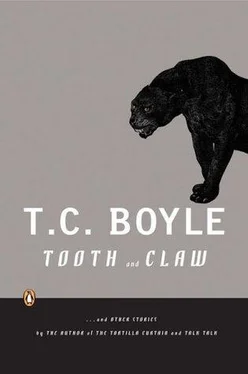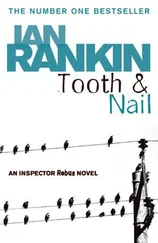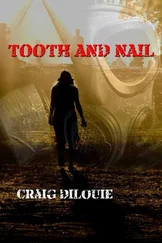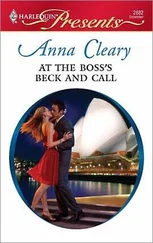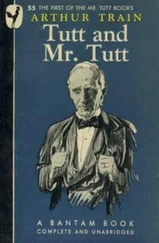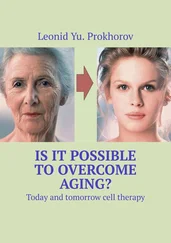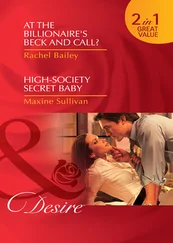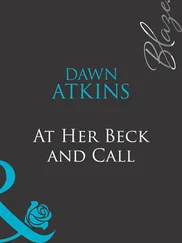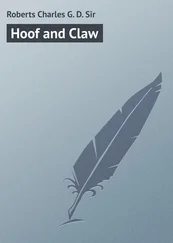Is she? They don’t answer such questions, don’t volunteer information, not over the phone. The next ten seconds are thunderous, cataclysmic, my wife standing there numbly with the phone in her hand as if it’s some unidentifiable object she’s found in the street while I fumble out of bed to snatch for my pants — and my shoes, where are my shoes? The car keys? My wallet? This is the true panic, the loss of faith and control, the nameless named, the punch in the heart and the struggle for breath. I say the only thing I can think to say, just to hear my own voice, just to get things straight, “She was in an accident. Is that what they said?”
“She was hit by a car. She’s — they don’t know. In surgery.”
“What hospital? Did they say what hospital?”
My wife is in motion now too, the negligee ridiculous, unequal to the task, and she jerks it over her head and flings it to the floor even as she snatches up a blouse, shorts, flip-flops — anything, anything to cover her nakedness and get her out the door. The dog is whining in the kitchen. There is the sound of the rain on the roof, intensifying, hammering at the gutters. I don’t bother with shoes — there are no shoes, shoes do not exist — and my shirt hangs limply from my shoulders, misbuttoned, sagging, tails hanging loose, and we’re in the car now and the driver’s side wiper is beating out of sync and the night closing on us like a fist.
AND THEN there’s Chicxulub. Sixty-five million years ago, an asteroid (or perhaps a comet — no one is quite certain) collided with the Earth on what is now the Yucatán Peninsula. Judging from the impact crater, which is one hundred and twenty miles wide, the object — this big flaming ball — was some six miles across. When it came down, day became night and that night extended so far into the future that at least seventy-five percent of all known species were extinguished, including the dinosaurs in nearly all their forms and array and some ninety percent of the oceans’ plankton, which in turn devastated the pelagic food chain. How fast was it traveling? The nearest estimates put it at 54,000 miles an hour, more than sixty times the speed of a bullet. Astrophysicists call such objects “civilization enders,” and calculate the chances that a disaster of this magnitude will occur during any individual’s lifetime at roughly one in ten thousand, the same odds as dying in an auto accident in the next ten months — or, more tellingly, living to be a hundred in the company of your spouse.
ALL I SEE is windows, an endless grid of lit windows climbing one atop the other into the night, as the car shoots through the Emergency Vehicles Only lane and slides in hard against the curb. Both doors fling open simultaneously. Maureen is already out on the sidewalk, already slamming the door behind her and breaking into a trot, and I’m right on her heels, the keys still in the ignition and the lights stabbing at the pale underbelly of a diagonally parked ambulance — and they can have the car, anybody can have it and keep it forever, if they’ll just tell me my daughter is all right. Just tell me , I mutter, hurrying, out of breath, soaked through to the skin, just tell me and it’s yours , and this is a prayer, the first of them in a long discontinuous string, addressed to whomever or whatever may be listening. Overhead, the sky is having a seizure, black above, quicksilver below, the rain coming down in windblown arcs, and I wouldn’t even notice but for the fact that we are suddenly — instantly — wet, our hair knotted and clinging and our clothes stuck like flypaper to the slick tegument of our skin.
In we come, side by side, through the doors that jolt back from us in alarm, and all I can think is that the hospital is a death factory and that we have come to it like the walking dead, haggard, sallow, shoeless. “My daughter,” I say to the nurse at the admittance desk, “she’s — they called. You called. She’s been in an accident.”
Maureen is at my side, tugging at the fingers of one hand as if she’s trying to remove an invisible glove, her shoulders slumped, mouth set, the wet blouse shrink-wrapping her. “A car. A car accident.”
“Name?” the nurse asks. (About this nurse: she’s young, Filipina, with opaque eyes and the bone structure of a cadaver; every day she sees death and it blinds her. She doesn’t see us. She sees a computer screen, she sees the TV monitor mounted in the corner and the shadows that pass there, she sees the walls, the floor, the naked light of the fluorescent tube. But not us. Not us.)
For one resounding moment that thumps in my ears and then thumps again, I can’t remember my daughter’s name — I can picture her leaning into the mound of textbooks spread out on the dining room table, the glow of the overhead light making a nimbus of her hair as she glances up at me with a glum look and half a rueful smile, as if to say, It’s all in a day’s work for a teenager, Dad, and you’re lucky you’re not in high school anymore , but her name is gone.
“Maddy,” my wife says. “Madeline Biehn.”
I watch, mesmerized, as the nurse’s fleshless fingers maneuver the mouse, her eyes fixed on the screen before her. A click. Another click. The eyes lift to take us in, even as they dodge away again. “She’s still in surgery,” she says.
“Where is it?” I demand. “What room? Where do we go?”
Maureen’s voice cuts in then, elemental, chilling, and it’s not a question she’s posing, not a statement or demand, but a plea: “What’s wrong with her?”
Another click, but this one is just for show, and the eyes never move from the screen. “There was an accident,” the nurse says. “She was brought in by the paramedics. That’s all I can tell you.”
It is then that I become aware that we are not alone, that there are others milling around the room — other zombies like us, hurriedly dressed and streaming water till the beige carpet is black with it, shuffling, moaning, clutching at one another with eyes gone null and void — and why, I wonder, do I despise this nurse more than any human being I’ve ever encountered, this young woman not much older than my daughter, with her hair pulled back in a bun and the white cap like a party favor perched atop it, who is just doing her job ? Why do I want to reach across the counter that separates us and awaken her to a swift sure knowledge of hate and fear and pain? Why?
“Ted,” Maureen says, and I feel her grip at my elbow, and then we’re moving again — hurrying, sweeping, practically running — out of this place, down a corridor under the glare of the lights that are a kind of death in themselves, and into a worse place, a far worse place.
THE THING THAT disturbs me about Chicxulub, aside from the fact that it erased the dinosaurs and wrought catastrophic and irreversible change, is the deeper implication that we, and all our works and worries and attachments, are so utterly inconsequential. Death cancels our individuality, we know that, yes, but ontogeny recapitulates phylogeny and the kind goes on, human life and culture succeed us — that, in the absence of God, is what allows us to accept the death of the individual. But when you throw Chicxulub into the mix — or the next Chicxulub, the Chicxulub that could come howling down to obliterate all and everything even as your eyes skim the lines of this page — where does that leave us?
“YOU’RE THE PARENTS?”
We are in another room, gone deeper now, the walls closing in, the loudspeakers murmuring their eternal incantations, Dr. Chandrasoma to Emergency, Dr. Bell, paging Dr. Bell , and here is another nurse, grimmer, older, with deader eyes and lines like the strings of a tobacco pouch pulled tight round her lips. She’s addressing us, me and my wife, but I have nothing to say, either in denial or affirmation. I’m paralyzed, struck dumb. If I claim Maddy as my own — and I’m making deals again — then I’m sure to jinx her, because those powers that might or might not be, those gods of the infinite and the minute, will see how desperately I love her and they’ll take her away just to spite me for refusing to believe in them. Voodoo, Hoodoo, Santeria, Bless me, Father, for I have sinned . I hear Maureen’s voice, emerging from a locked vault, the single whispered monosyllable, and then: “Is she going to be all right?”
Читать дальше
